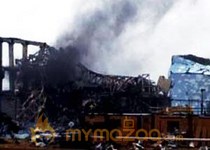Levels of radioactive materials detected in a reactor building at a stricken nuclear plant in northeastern Japan were 10 million times above normal level, the operator said Sunday.
Tokyo Electric Power Co said radiated water was in the basement of the turbine building attached to reactor No.2 at Fukushima 1 power plant that was damaged by the March 11 earthquake and resulting tsunami, public broadcaster NHK reported.
The company said the high levels of radiation might have seeped from a damaged reactor core.
Radiation-contaminated water had been found near four of the six reactors at the plant.
The operator vowed to clear the water as quickly as possible to allow workers access to the overheating reactors as they attempt to restore key cooling systems.
On Thursday, three engineers working on the cable system at reactor No.3 were exposed to radiation levels in water that were 10,000 times above normal. Two were hospitalized with burns to their legs.
The government said on Sunday that levels of radioactive materials detected in the sea near the plant rose to 1,850 times above normal.
That level of radioactive iodine-131 concentration was measured in seawater sample taken Saturday off the coast of the Fukushima 1 power plant, the government’s nuclear safety commission said.
Levels of radioactive iodine-131 had reached 1,250 times above normal in a sample taken Friday.
After the level had stayed around 100 times over the legal limit, it climbed to its highest since the survey began this week, Kyodo News reported.
But the commission said Saturday that it would not have a significant impact on fishery products as fishing is not conducted within 20 km of the plant.
Radioactive materials “will significantly dilute” by the time they would be consumed by marine species, the commission said.
The toll from the 9.0-magnitude quake and tsunami stood at 10,489 Sunday, while 16,621 people were listed as missing, police said.







